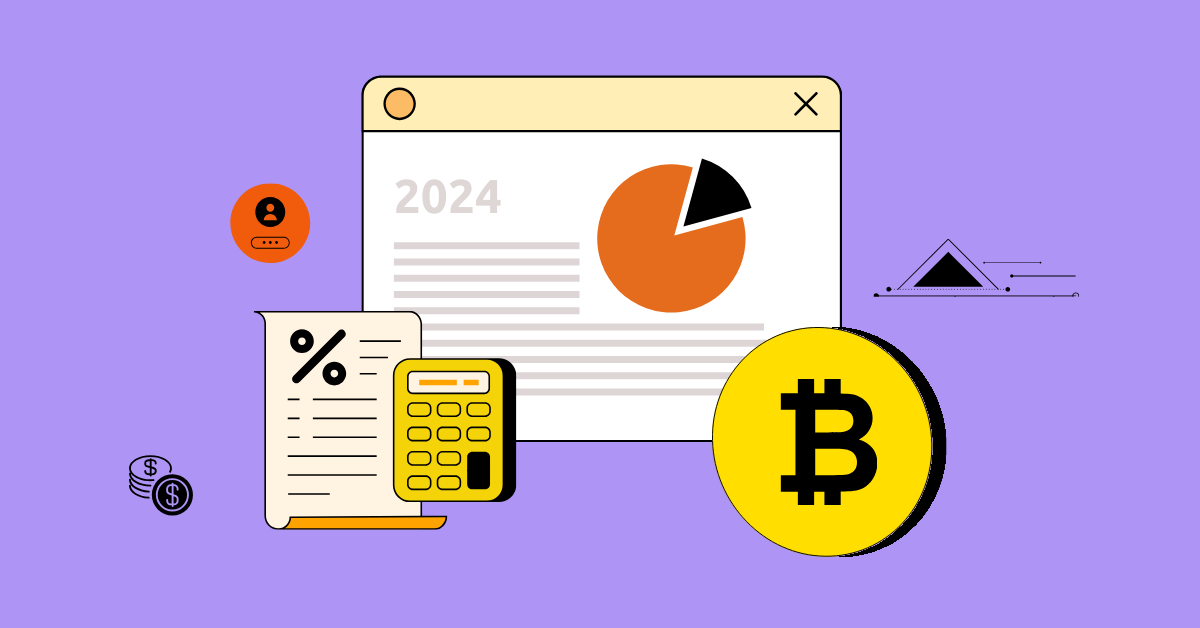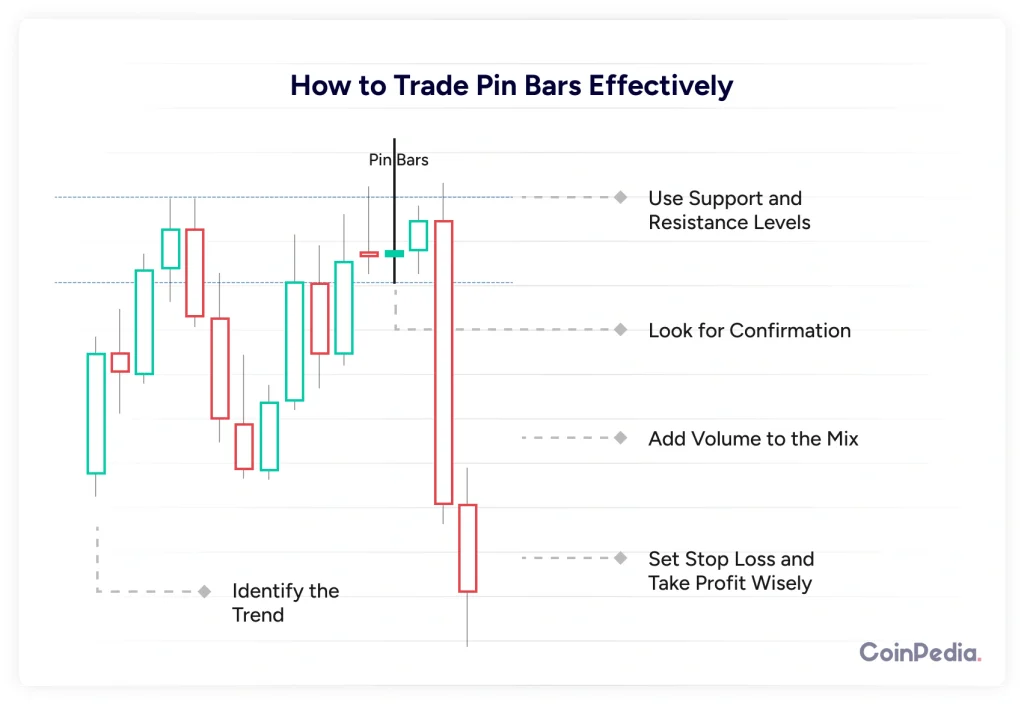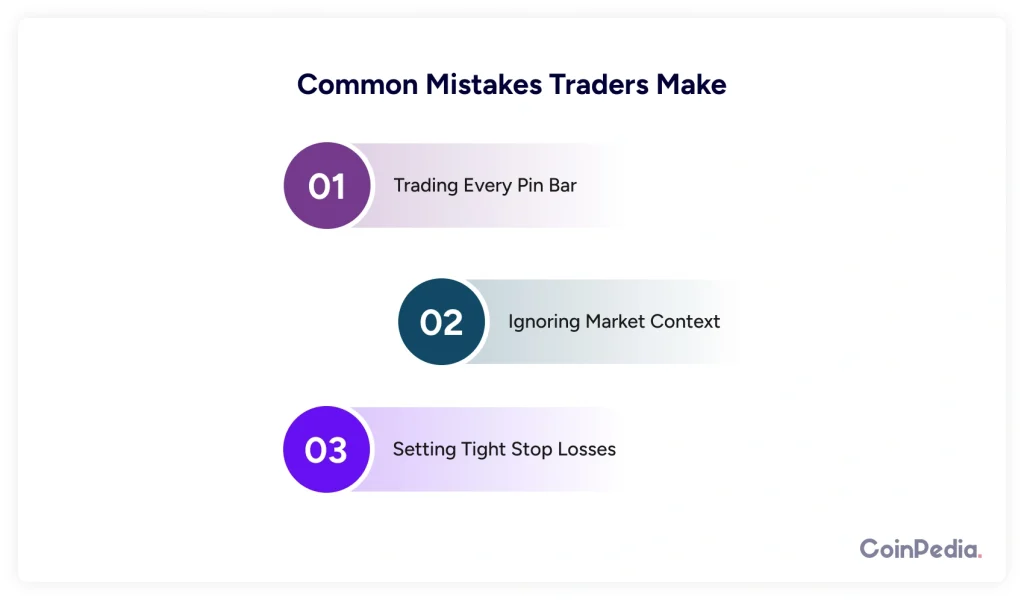
Ever wondered why some traders seem to spot trend reversals before everyone else? They don’t have a crystal ball. Instead, they use simple yet powerful candlestick patterns like the Pin Bar.
Now, if you’ve been trading for a while, you’ve probably heard of Pin Bars. But do you really know how to use them? Trust me, understanding this pattern can change how you look at price action.
Let’s break it all down in a simple, no-nonsense way.
What is a Pin Bar?
A Pin Bar is a single candlestick pattern that signals a possible reversal in the market. It has a small body and a long wick (also called a shadow). The wick is much longer than the body, showing that price was pushed in one direction but couldn’t hold.
There are two main types:
- Hammer (Bullish Pin Bar) – Appears at the bottom of a downtrend.
- Shooting Star (Bearish Pin Bar) – Appears at the top of an uptrend.
The secret? It’s all about who’s winning the battle between buyers and sellers.
Hammer (Bullish Pin Bar)
How to Spot a Hammer:
- Small body (near the top of the candlestick)
- Long lower wick (at least twice the size of the body)
- Very small or no upper wick
- Appears after a downtrend
What It Means:
Imagine price is dropping, and traders expect it to continue. Suddenly, buyers step in and push the price back up. Even though sellers tried to bring it lower, they lost control. This shows a strong rejection of lower prices and signals a potential trend reversal.
Example:
Let’s say Bitcoin has been dropping for several days. On the next daily chart, you see a hammer with a long lower wick. This means buyers are stepping in. If the next candle confirms by closing higher, it’s a strong signal that Bitcoin might start moving up.
Shooting Star (Bearish Pin Bar)
How to Spot a Shooting Star:
- Small body (near the bottom of the candlestick)
- Long upper wick (at least twice the size of the body)
- Very small or no lower wick
- Appears after an uptrend
What It Means:
Price has been moving up, but then sellers step in and push it back down. The long upper wick shows that buyers tried to keep pushing but failed. This often leads to a trend reversal or at least a pullback.
Example:
Imagine Tesla stock is in an uptrend. One day, it forms a Shooting Star with a long upper wick. The next day, the price opens lower and continues to drop. That Shooting Star was the warning signal that the uptrend was losing strength.
How to Trade Pin Bars Effectively
Spotting a Pin Bar is one thing, but trading it correctly is where the real magic happens. Here’s how you can do it:
1. Identify the Trend
First, check the overall trend. Pin Bars work best when they appear at key levels of support and resistance. A Hammer at the bottom of a downtrend is more reliable than one that randomly appears in the middle of a range.
2. Look for Confirmation
Never trade a Pin Bar in isolation. Always wait for confirmation. For example, if you see a Hammer, the next candle should close above the Hammer’s high to confirm the reversal.
3. Use Support and Resistance Levels
Pin Bars are most effective when they appear at strong support or resistance zones. A Shooting Star at a major resistance level is a strong sell signal. A Hammer at a major support level is a strong buy signal.
4. Add Volume to the Mix
High volume on a Pin Bar increases its reliability. If a Hammer forms with high buying volume, it’s a strong indication that buyers are serious.
5. Set Stop Loss and Take Profit Wisely
- For Hammers: Place stop loss below the wick.
- For Shooting Stars: Place stop loss above the wick.
- Take Profit: Aim for the next key support or resistance level.

Common Mistakes Traders Make
1. Trading Every Pin Bar
Not every Pin Bar is worth trading. If it forms in the middle of a choppy market with no clear trend, it’s best to ignore it.
2. Ignoring Market Context
A Pin Bar alone doesn’t guarantee success. Always consider factors like trend strength, volume, and news events.
3. Setting Tight Stop Losses
Pin Bars have long wicks. Placing stop losses too close can get you stopped out before the trade even has a chance to move.

Final Thoughts
The Pin Bar is one of the most powerful candlestick patterns for traders. Whether you’re trading forex, stocks, or crypto, mastering this pattern can give you an edge.
Remember:
- A Hammer signals potential bullish reversal.
- A Shooting Star signals potential bearish reversal.
- Always trade with confirmation and at key support/resistance levels.
Now, go to your charts, find some Pin Bars, and see how they play out. The more you practice, the better you’ll get at spotting high-probability setups.
FAQs
Yes, Pin Bars can appear on any timeframe, but their reliability increases on higher time frames like the 4-hour, daily, or weekly charts. On lower time frames, there’s more market noise, so it’s crucial to use additional confirmation signals like volume or trend strength.
While Pin Bars are most effective in trending markets, they can also signal reversals within a range. For example, a Hammer forming at the bottom of a range may indicate a bounce, while a Shooting Star at the top of a range may signal a rejection.
Absolutely! Many traders combine Pin Bars with indicators like moving averages, RSI, or Bollinger Bands for added confirmation. For instance, a Hammer forming near an oversold RSI level strengthens the bullish reversal signal.
A Pin Bar with a small wick is less significant because the long wick is what signals price rejection. If the wick isn’t at least twice the size of the body, it may not be a strong reversal signal.
No pattern guarantees success 100% of the time. The probability of a Pin Bar leading to a profitable trade depends on factors like market context, trend strength, and confirmation signals. When used correctly, they can provide a solid edge, but risk management is still essential.
We'd Love to Hear Your Thoughts on This Article!
Was this writing helpful?
 Yes
Yes  No
No
Trust with CoinPedia:
CoinPedia has been delivering accurate and timely cryptocurrency and blockchain updates since 2017. All content is created by our expert panel of analysts and journalists, following strict Editorial Guidelines based on E-E-A-T (Experience, Expertise, Authoritativeness, Trustworthiness). Every article is fact-checked against reputable sources to ensure accuracy, transparency, and reliability. Our review policy guarantees unbiased evaluations when recommending exchanges, platforms, or tools. We strive to provide timely updates about everything crypto & blockchain, right from startups to industry majors.
Investment Disclaimer:
All opinions and insights shared represent the author's own views on current market conditions. Please do your own research before making investment decisions. Neither the writer nor the publication assumes responsibility for your financial choices.
Sponsored and Advertisements:
Sponsored content and affiliate links may appear on our site. Advertisements are marked clearly, and our editorial content remains entirely independent from our ad partners.




